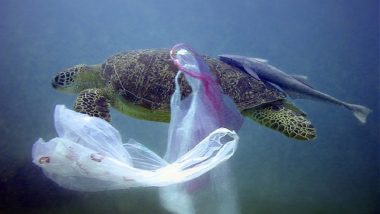The European Commission on Monday proposed banning single-use plastic products such as cotton buds and plastic straws and putting the burden of cleaning up waste on manufacturers in an effort to reduce marine litter.
Under the proposal, single-use plastic products including straws, cotton buds, cutlery, balloon sticks and drink stirrers with readily available alternatives will be banned and replaced with more environmentally sustainable materials.
The plan needs to be approved by the 28 member states and the European Parliament before it can be passed as law. The EU estimates that the ban will help:
-
- Avoid 3.4 million tonnes of carbon emissions
- Prevent damage to the environment that would cost the equivalent of €22bn (£19.2bn) by 2030
- Save consumers €6.5bn
EU First Vice-President Frans Timmermans explained the rationale behind the measure saying, "Today's proposals will reduce single-use plastics on our supermarket shelves through a range of measures.” "We will ban some of these items and substitute them with cleaner alternatives, so people can still use their favourite products," he added.
The proposal also requires EU countries to collect 90 percent of single-use plastic drink bottles by 2025 and producers to help cover costs of waste management and clean-up.
Plastic accumulating in the world's oceans has become a major policy issue for governments, with scientists warning of their effect on the food chain.
Research published in the online journal Scientific Reports estimates a garbage patch of some 79,000 metric tonnes - 1.8 trillion pieces - of plastic has formed in the Pacific Ocean, mainly consisting of fishing nets, plastic containers, packaging and ropes.
The Great Pacific Garbage Patch from Ben Segall on Vimeo.
The measure by EU comes just a week after global food chain giant McDonalds’ shareholders voted against taking the first step toward a ban on plastic straws. The measure would have required McDonald's to prepare a report to shareholders about the business risks of using alternatives to plastic straws.
The fast-food chain distributes an estimated 95 million single-use straws around the world every day, according to the consumer advocacy group SumOfUs. "The problem with plastic is that it never disappears. It breaks into smaller and smaller pieces," marine biologist and SumOfUs member Elaine Leung said at the meeting. "Although many of you may see plastic straws as a harmless little item, they soon add up and their size means they pose a particular hazard (to animals and humans alike)."
(The above story first appeared on LatestLY on May 29, 2018 08:49 AM IST. For more news and updates on politics, world, sports, entertainment and lifestyle, log on to our website latestly.com).













 Quickly
Quickly


